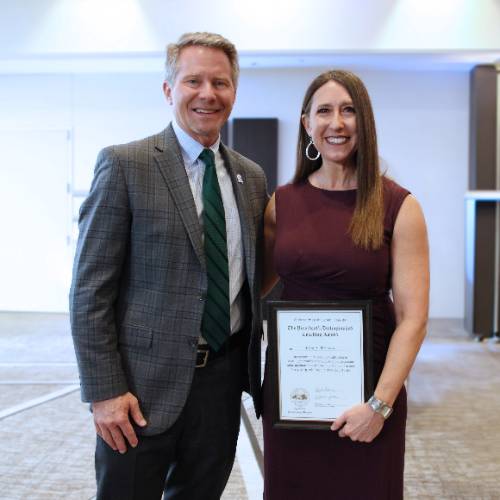Pains and pounds: A partnering pursuit
Article Highlights
- Supported by a $1.36 million Department of Defense grant, the research will explore the relationship between chronic pain and obesity.
- The researchers hypothesize that targeting the neurotensin system could promote weight loss and relieve pain simultaneously.
- Leinninger specializes in neurons responsible for feeding behavior, while Laumet focuses on neurons modulating pain perception.

An unprecedented collaboration is underway within the Michigan State University Department of Physiology, blending the realms of neuroscience, pain perception and metabolism.
Associate Professor Gina Leinninger and Assistant Professor Geoffroy Laumet have teamed up to embark on a groundbreaking research project with the support of a four-year, $1.36 million Department of Defense partnering principal investigator (PI) grant. The two researchers are hoping to discover the intricate relationship between chronic pain and obesity, a dual epidemic affecting millions of Americans, particularly veterans who are more susceptible to these health issues than the general population.
"Our goal is to understand how neurons in the brain use a neurochemical called neurotensin to modify feeding and pain that might be useful to relieve obesity and obesity-induced pain," said Leinninger, adding that one-third of Americans are obese and at an increased risk to develop chronic pain. "Neurotensin has been shown in separate studies to reduce feeding and relieve pain, but how and where it does so is unclear."
Leinninger and Laumet built the hypothesis that the neurotensin system may be a target to simultaneously promote weight loss and relieve pain, which would be ideal for addressing comorbid obesity and chronic pain.
"Our discoveries may be a breakthrough for treating people suffering from both chronic pain and obesity, especially veterans who have given so much for their country," Laumet said.

The partner principal investigator (PI) grant wouldn't have been possible without Leinninger's research of neurons responsible for feeding behavior and Laumet's study of neurons modulating pain perception.
"Together we have the ideal combination of expertise and unique reagents necessary to address this cross-disciplinary topic," said Leinninger, who is also the director of the department's Molecular, Cellular and Integrative Physiology graduate program.
"This project could not be undertaken by either PI individually, but together our expertise makes us uniquely positioned to address this significant line of research."
In the long term, Leinninger and Laumet aim to wield their newfound knowledge to design safe and effective treatments for the millions suffering from this dual affliction.
"We hope to develop the idea that the same drug may alleviate both diseases," Laumet said.
Looking ahead, Laumet hopes this is the start of a long collaboration between the two labs.
"Four years will never be enough to address all the questions we have about the physiology of these neurons," he said. "Outstanding questions for the future include, 'What happens in these neurons for a person with obesity, [significant] weight loss, or anorexia?'"
As for Leinninger, the collaboration holds a deeper and personal meaning.
"I have long wanted to study how neurotensin might be used to alleviate pain, but just didn't have the additional expertise to do so," she said, acknowledging Laumet's expertise in the neurobiology of pain. "Now I can funnel [my] original curiosity about how brain signals modify behavior to an important health problem that I've long been wanting to study. This is a realization of my lifelong academic and personal goals."



